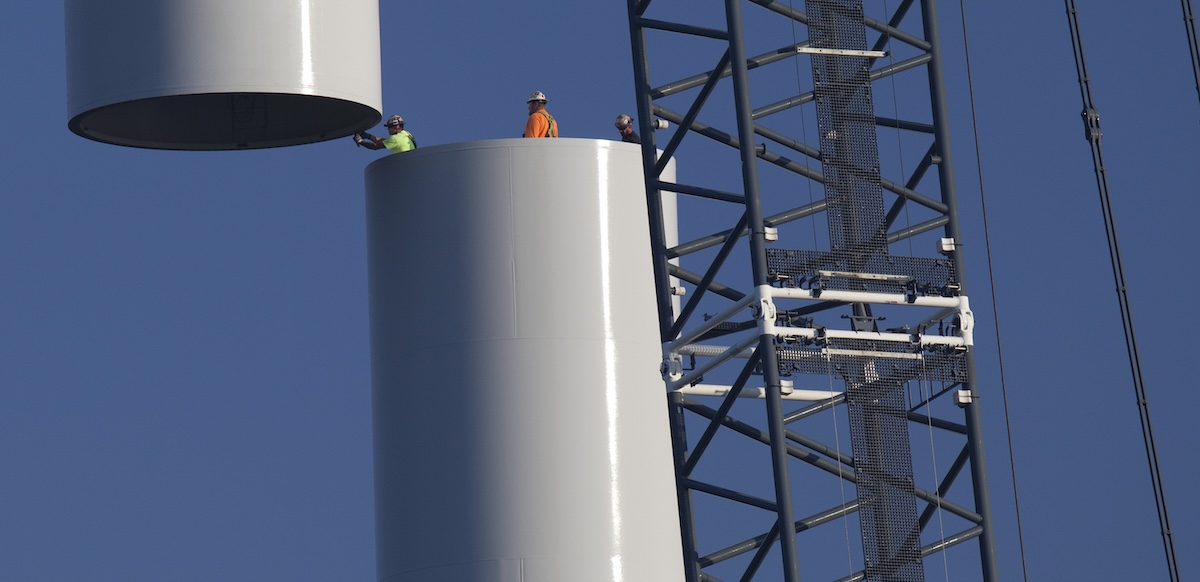Fight the Boss, Build a Green Future

Workers construct a wind turbine. Photo: Jim West, jimwestphoto.com
As the Trump administration sows chaos, it is only intensifying global heating—and the storms, heat waves, and fires that come with it—while gutting the safety nets that should support working people in times of crisis.
If the “cost of living” is angering and dividing folks now, imagine what compounding climate disasters will do to food, water, energy, and housing costs.
We have to keep our eyes on the prize: an economy that sustains workers and their families, and allows us the free time to enjoy the wealth and communities we create.
Right now, we won’t get far with efforts to win new federal laws for climate. But workplace fights are more important than ever.
We won’t get the world we want until we demand it. We can’t just react to crisis after crisis—we have to stay on offense, to force our bosses to either come along or get out of the way.
We have plenty of good ideas for a fossil-fuel-free future, but the perfect policy platform won’t matter if it’s never enacted. What’s often missing from environmental plans is the power to beat corporate opposition.
WHERE'S OUR POWER?
That power is in our hands as workers—the power to disrupt the flow of profits.
In the last century, workers fought for the eight-hour work day, time off, and the right not to be harmed at work, and most workers won these protections through the Fair Labor Standards Act and the Occupational Safety and Health Act.
Labor unrest peaking in the 1930s secured the rights to recognized unions, enforceable contracts, and democratically elected leaders under the National Labor Relations Act and other labor laws.

SUPPORT LABOR NOTES
BECOME A MONTHLY DONOR
Give $10 a month or more and get our "Fight the Boss, Build the Union" T-shirt.
In the civil rights movement, workers won the Equal Employment Opportunity Commission as part of the Civil Rights Act, reining in the discrimination that bosses use to divide and exploit us.
Workers in some sectors—agricultural and domestic workers, and many public sector workers—didn't get to enjoy many of these advances. Those who did are now watching these victories crumble at the federal level.
We shouldn’t just beg to go back to where we were. We need a united fight for more: for work that meets a higher standard, that doesn’t set up a dystopia for our kids and grandkids.
CLEAR SOLUTIONS
In this issue, you’ll find practical ideas to organize for better jobs and working conditions, solidarity for safety in a dangerous climate, and organizing the unorganized in growing green industries (check out the cool map on pages 8-9). As stories from Mexico and Canada show, it’s not just workers in the U.S. who are rising to meet our planet-wide climate challenges.
It takes practical organizing skills to move your co-workers into action—whether on climate change or any other topic. Which issues are widely and deeply felt, and have clear solutions? Who has the power to grant the demand, and what will it take to move that person?
The stories in this issue connect those dots. In each one, a union has broken off the piece of the climate crisis that’s within reach and meaningful to its members. Sometimes that’s the workplace impact of heat waves, or the possibility of building a different product, or a demand for public investment in green transit, or removing toxic lead from schools.
As the civil rights anthem “Keep Your Eyes on the Prize” puts it, “The only thing that we did wrong was staying in the wilderness a day too long. The only thing that we did right was the day we started to fight.” We hope this special issue of Labor Notes inspires more workers to start to fight.
For more content from the April 2025 Jobs and Climate special issue, go here.





